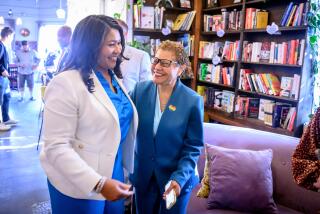For Bradley, It May Have Been the Most Important Speech of His Political Life
- Share via
After weeks of planning, meetings with his closest political, media and legal advisers and countless rewrites of what was arguably the most important speech in his 26-year political career, Mayor Tom Bradley strode into his conference room.
The room had been transformed, like a Hollywood set, to resemble the chief executive’s office. Using a tissue to pat beads of sweat on his balding head and being careful to not smudge his make-up, Bradley waited for his cue from Press Secretary William Chandler at precisely 5:02 p.m. Wednesday.
“Bill, Bill, give me the countdown,” Bradley said.
With seconds to go, Chandler flashed his fingers for the final countdown.
Bradley then embarked on an unprecedented 40-minute speech, broadcast live during the prime television news hour, and answered questions for another 20 minutes from reporters about City Atty. James K. Hahn’s scathing 1,650-page report on conflict-of-interest allegations.
To take his case “to the people,” as the mayor said he wanted to do, was a calculated risk. On one hand, the live broadcast had the advantage of allowing Bradley an unfiltered appeal directly to the people, according to political consultants and experts. But the tactic required that the mayor convincingly tell his version of a complex series of transactions.
Every detail, from the three flags and blue velvet curtains hung behind him to the massive desk moved into the conference room, was designed to set a tone and send a message to what the mayor and his staff hoped would be an audience of hundreds of thousands of Los Angelenos.
While some media consultants on Thursday were applauding the mayor’s ability to manipulate the media into providing him with uninterrupted prime television news time on the three largest stations in the market, aides to the mayor acknowledged that they really planned on getting just 10 minutes of coverage.
And some consultants said that extended performance may have cost him some audience and some credibility.
“The speech was in two parts,” said one mayoral aide who asked not to be identified. “There was a 10-minute opening statement” and then the mayor digressed into a somber recitation of his responses to the city attorney’s report.
“We figured the stations would cut out after the first 10 or 15 minutes,” the aide said.
But due to what television officials said was competitive pressures--”we’re all waiting to see who blinks first,” said one producer--and a sense of good public affairs programming, all three network affiliates in Los Angeles stayed on with the entire address and much of the question-and-answer period.
“The problem is, that can cut two ways,” said Ken Khachigian, a veteran speech writer who has written for Presidents Ronald Reagan and Richard M. Nixon and for Gov. George Deukmejian. “The live speech allows you to tell your side of the story. But it also ties a big red ribbon around it that says, ‘This is a big deal and if you don’t believe it, here’s 40 minutes of television about it.’ ”
Khachigian said the politician can appear to “protest too much when struggling to explain the thing. . . . The common man then thinks, ‘This guy stepped in a pile of it and he is trying to get out. . . . It’s like quicksand: the more you struggle, the more you’re in it.” And that impression, he said, “is a major, negative down side.”
Still, media consultants said Bradley’s strategists staged an impressive show and managed to get exactly the context they wanted for the mayor’s long-awaited address.
“The idea of going live, rather than through a filter (reporters and editors) was very, very smart,” said one Los Angeles-based media consultant who did not want to be identified.
And the make-believe office setting--”the flag, the desk, the blue”--was intended to “look presidential, and it did,” he said.
The desk, and absence of reporters from the screen “made it look like ‘let me sit down and talk to you man to man. . . . We don’t need these other folks to get in the way,’ ” the consultant said.
The set, and the tone--to explain rather than apologize--were both conditions set by Bradley, over some staff objections, according to aides.
Bradley wanted to walk viewers through each of the controversial financial transactions, while some aides argued, “don’t give (the press) anything to poke holes in,” said another aide.
The television stations--KNBC, KABC and KCBS--took risks of their own.
The stations, in staying live with the complete address, gave up valuable advertising time and viewership.
At KNBC, for instance, only 27% of viewers actually live in Los Angeles, officials said. And many viewers were not interested in the topic or got bored with the length of the speech, overnight ratings figures show.
KNBC, which normally has about 20% of the viewing market between 5 and 6 p.m., fell to about 13% during Bradley’s address.
Times Staff Writer Glenn F. Bunting contributed to this story.
More to Read
Get the L.A. Times Politics newsletter
Deeply reported insights into legislation, politics and policy from Sacramento, Washington and beyond. In your inbox twice per week.
You may occasionally receive promotional content from the Los Angeles Times.










